Beyond Human Bounds
The Spectrum Of Potential Consciousness Types In Diverse Life Forms Across The CosmosCredit: MindplexThe evolution of consciousness, particularly as it veers towards spiral models, is a cosmic journey for humanity and for all life forms across the universe. As we step into the realms of space exploration and encounter varied planetary environments, the canvas of potential consciousness types broadens immensely. This article, drawing inspiration from the TING Consciousness Scale, explores the myriad possibilities of consciousness evolution among diverse life forms, highlighting the transition from egoism to altruism as a universal path towards higher collective awareness and harmony.The Spectrum of Consciousness in Diverse Life Forms:Consciousness, as we understand it, varies significantly across different life forms. From the basic sensory awareness in single-celled organisms to the complex self-awareness in humans, consciousness manifests in multifaceted forms. This spectrum becomes even more intriguing when we consider extraterrestrial life forms, each adapted to its unique environment, potentially developing distinct types of consciousness.Potential Consciousness Types in Extraterrestrial Environments:Adaptive Consciousness: Life forms on planets with harsh, changing environments might evolve an adaptive consciousness, characterized by rapid sensory and cognitive adjustments.Collective Hive Consciousness: On planets where survival hinges on cooperation, species may develop a hive-like consciousness, emphasizing collective over individual awareness.Quantum Consciousness: In environments with extreme physical conditions, life forms might harness quantum mechanics in their consciousness, leading to profoundly different perceptions of reality.Cybernetic Consciousness: For life forms that merge with technology, a cybernetic consciousness, integrating artificial intelligence with biological cognition, could emerge.Explore More About Potential Consciousness Types in Extraterrestrial Environments below.The Role of Environment in Shaping Consciousness:The environment plays a crucial role in the evolution of consciousness. Planetary conditions like gravity, atmosphere, and resource availability can significantly influence the development of cognitive abilities in life forms. This environmental influence suggests that extraterrestrial consciousness types could be vastly different from what we observe on Earth.The TING Consciousness Scale and Extraterrestrial Life:The TING Scale, initially conceptualized for human civilization, can be adapted to gauge the consciousness level of extraterrestrial species. This scale could help us understand where these species stand in terms of cognitive development, from basic survival consciousness (Type 0) to a more advanced, interconnected cosmic awareness (Type III).The Universal Shift from Egoism to Altruism:Irrespective of the type of consciousness, a shift from ego-centric survival to altruistic cooperation could be a universal trend among advanced life forms. This shift is not just a moral choice but a strategic adaptation for survival and thriving in the cosmic ecosystem.Implications for Humanity and Space Exploration:Understanding the potential consciousness types of other life forms can profoundly impact our approach to space exploration. It encourages a mindset of respect, cooperation, and open-mindedness as we interact with extraterrestrial life. Additionally, this knowledge can inspire new models of social organization and technological development on Earth. The exploration of consciousness types among diverse life forms across the universe opens a gateway to understanding the vast potentialities of cognitive evolution. By adopting the TING Consciousness Scale as a universal framework and embracing the shift from egoism to altruism, both terrestrial and extraterrestrial life forms can aspire to higher levels of collective awareness and harmony. This journey transcends the bounds of human understanding, inviting us to envision a future where diverse consciousness types coexist and enrich the cosmic fabric of life.Potential Consciousness Types in Extraterrestrial EnvironmentsAdaptive Consciousness:In planets with extreme and rapidly changing environments, life forms might evolve an ‘Adaptive Consciousness.’ This consciousness type would be characterized by an extraordinary ability to perceive and respond to environmental fluctuations at an unprecedented rate. Imagine a species on a planet with erratic climate patterns; their consciousness would need to process and adapt to these changes almost instantaneously to survive. This could lead to the development of highly advanced sensory systems, a deep-rooted instinctual intelligence, and perhaps even the ability to predict environmental shifts before they occur. Such a consciousness type would not only be reactive but also proactive, anticipating changes and preparing in advance, marking a significant evolution in survival st
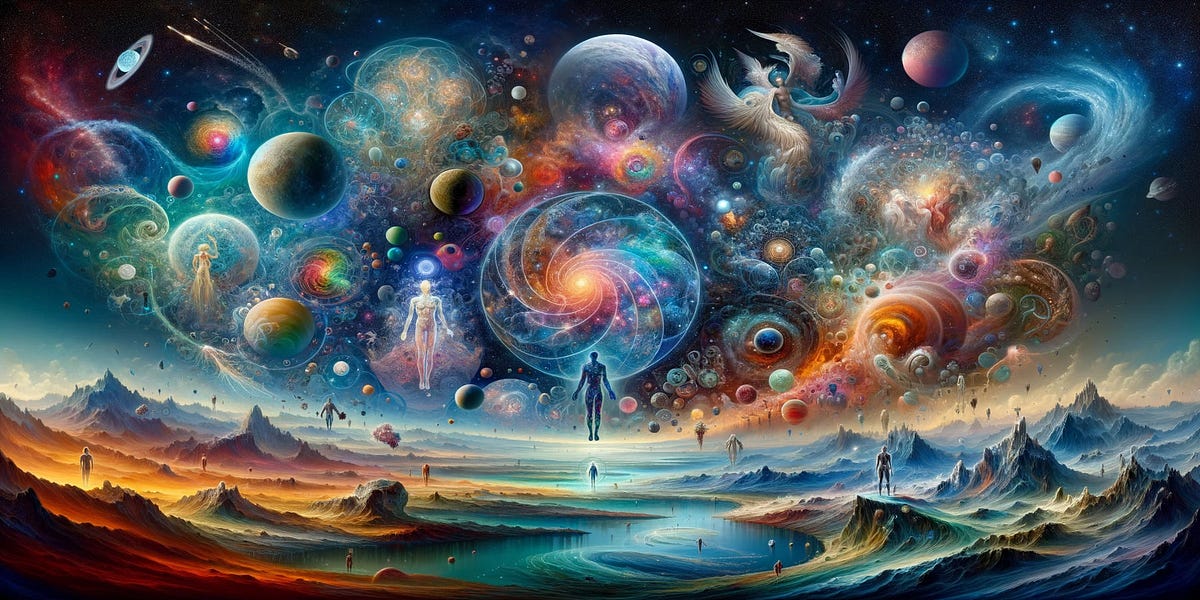
The Spectrum Of Potential Consciousness Types In Diverse Life Forms Across The Cosmos

The evolution of consciousness, particularly as it veers towards spiral models, is a cosmic journey for humanity and for all life forms across the universe. As we step into the realms of space exploration and encounter varied planetary environments, the canvas of potential consciousness types broadens immensely. This article, drawing inspiration from the TING Consciousness Scale, explores the myriad possibilities of consciousness evolution among diverse life forms, highlighting the transition from egoism to altruism as a universal path towards higher collective awareness and harmony.
The Spectrum of Consciousness in Diverse Life Forms:
Consciousness, as we understand it, varies significantly across different life forms. From the basic sensory awareness in single-celled organisms to the complex self-awareness in humans, consciousness manifests in multifaceted forms. This spectrum becomes even more intriguing when we consider extraterrestrial life forms, each adapted to its unique environment, potentially developing distinct types of consciousness.
Potential Consciousness Types in Extraterrestrial Environments:
- Adaptive Consciousness: Life forms on planets with harsh, changing environments might evolve an adaptive consciousness, characterized by rapid sensory and cognitive adjustments.
- Collective Hive Consciousness: On planets where survival hinges on cooperation, species may develop a hive-like consciousness, emphasizing collective over individual awareness.
- Quantum Consciousness: In environments with extreme physical conditions, life forms might harness quantum mechanics in their consciousness, leading to profoundly different perceptions of reality.
Cybernetic Consciousness: For life forms that merge with technology, a cybernetic consciousness, integrating artificial intelligence with biological cognition, could emerge.
Explore More About Potential Consciousness Types in Extraterrestrial Environments below.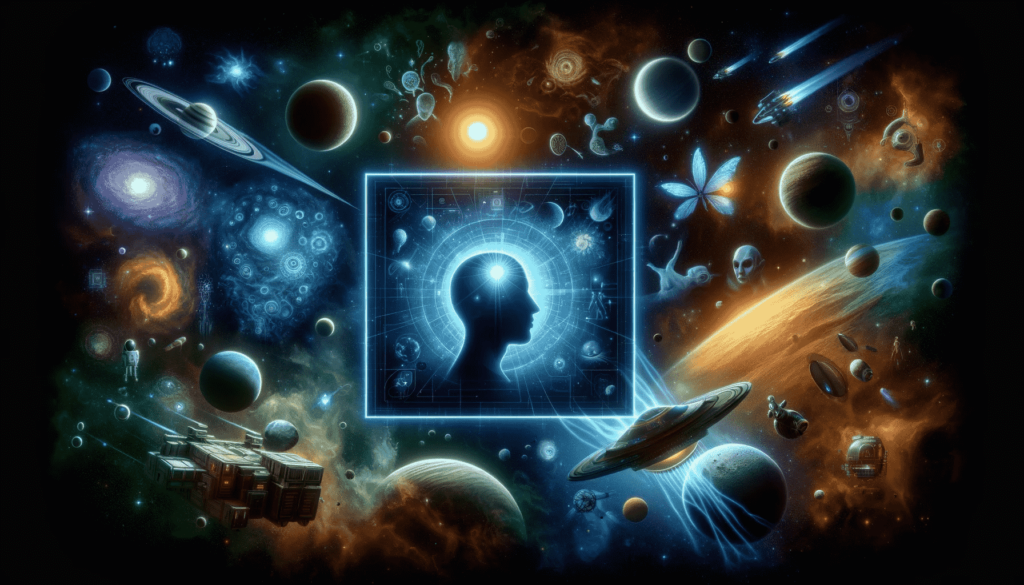
The Role of Environment in Shaping Consciousness:
The environment plays a crucial role in the evolution of consciousness. Planetary conditions like gravity, atmosphere, and resource availability can significantly influence the development of cognitive abilities in life forms. This environmental influence suggests that extraterrestrial consciousness types could be vastly different from what we observe on Earth.
The TING Consciousness Scale and Extraterrestrial Life:
The TING Scale, initially conceptualized for human civilization, can be adapted to gauge the consciousness level of extraterrestrial species. This scale could help us understand where these species stand in terms of cognitive development, from basic survival consciousness (Type 0) to a more advanced, interconnected cosmic awareness (Type III).
The Universal Shift from Egoism to Altruism:
Irrespective of the type of consciousness, a shift from ego-centric survival to altruistic cooperation could be a universal trend among advanced life forms. This shift is not just a moral choice but a strategic adaptation for survival and thriving in the cosmic ecosystem.
Implications for Humanity and Space Exploration:
Understanding the potential consciousness types of other life forms can profoundly impact our approach to space exploration. It encourages a mindset of respect, cooperation, and open-mindedness as we interact with extraterrestrial life. Additionally, this knowledge can inspire new models of social organization and technological development on Earth. The exploration of consciousness types among diverse life forms across the universe opens a gateway to understanding the vast potentialities of cognitive evolution. By adopting the TING Consciousness Scale as a universal framework and embracing the shift from egoism to altruism, both terrestrial and extraterrestrial life forms can aspire to higher levels of collective awareness and harmony. This journey transcends the bounds of human understanding, inviting us to envision a future where diverse consciousness types coexist and enrich the cosmic fabric of life.
Potential Consciousness Types in Extraterrestrial Environments
Adaptive Consciousness:
- In planets with extreme and rapidly changing environments, life forms might evolve an ‘Adaptive Consciousness.’ This consciousness type would be characterized by an extraordinary ability to perceive and respond to environmental fluctuations at an unprecedented rate. Imagine a species on a planet with erratic climate patterns; their consciousness would need to process and adapt to these changes almost instantaneously to survive. This could lead to the development of highly advanced sensory systems, a deep-rooted instinctual intelligence, and perhaps even the ability to predict environmental shifts before they occur. Such a consciousness type would not only be reactive but also proactive, anticipating changes and preparing in advance, marking a significant evolution in survival strategies.
Collective Hive Consciousness:
- On planets where survival is heavily reliant on community cooperation, species may develop a ‘Collective Hive Consciousness.’ This type of consciousness transcends individual awareness, favoring a shared cognitive network where thoughts, feelings, and experiences are instantaneously exchanged among members of the species. In such a society, the concept of individual identity might be minimal or nonexistent, with the collective’s wellbeing being the paramount concern. This shared consciousness could lead to highly efficient societies, where tasks are performed in perfect harmony and decisions are made for the greater good of the collective. The neural architecture of such species could be fascinating, possibly involving complex bio-telepathic networks or other forms of direct cognitive interconnectivity.
Quantum Consciousness:
- In environments with extreme physical conditions, where classical physics may not fully apply, life forms might develop a ‘Quantum Consciousness.’ This consciousness could harness quantum states, leading to an entirely different perception and interaction with reality. Such species might experience and process time non-linearly, have the ability to exist in multiple states simultaneously, or engage in instant communication across vast distances. Their understanding and interaction with the universe could be in ways incomprehensible to human cognition. Quantum Consciousness could open up possibilities for extraordinary cognitive abilities, like manipulating probability or perceiving multiple dimensions of reality.
Cybernetic Consciousness:
- For life forms that integrate with technology, ‘Cybernetic Consciousness’ could emerge. This would represent a symbiotic relationship between biological intelligence and artificial intelligence. Imagine a species that has naturally evolved or intentionally developed to merge its cognitive processes with advanced computing capabilities. Such a consciousness would not only have the organic emotional and intuitive abilities of biological life forms but also the immense processing power and memory capacity of computers. This amalgamation could lead to a highly advanced form of intelligence capable of complex problem-solving, vast data analysis, and perhaps even the ability to digitally back-up or transfer consciousness between different mediums, fundamentally altering the concepts of life and mortality.

Photosynthetic Consciousness:
- On planets where light from a star is a dominant energy source, species might develop a ‘Photosynthetic Consciousness.’ This type of consciousness could directly harness and utilize solar energy, integrating it into their cognitive processes. Such beings might have a heightened awareness of light patterns, enabling them to communicate through complex light signals or change their mental states based on solar energy levels. Their cognition and mood could fluctuate with the cycle of their star, leading to a unique symbiotic relationship with light.
Magnetic Field Consciousness:
- In environments with strong or fluctuating magnetic fields, life forms might evolve a ‘Magnetic Field Consciousness.’ This consciousness would be highly sensitive to magnetic forces, allowing these beings to navigate, communicate, or even manipulate magnetic fields. Such species might perceive the world in a fundamentally different way, as they could directly sense and interact with magnetic and electric fields, giving them an unparalleled ability to navigate their planet and possibly even detect space weather phenomena like solar flares.
Crystalline Consciousness:
- On planets with abundant crystal formations, a ‘Crystalline Consciousness’ could emerge. These life forms might have bodies composed of or integrated with crystalline structures, allowing them to store information, energy, or even consciousness within crystal matrices. They might communicate through vibrations or light refractions within crystals, leading to a form of consciousness that is distributed, durable, and capable of surviving in extreme conditions.
Fluid Dynamics Consciousness:
- In aquatic or gaseous environments where fluid dynamics play a crucial role, species might develop a ‘Fluid Dynamics Consciousness.’ This consciousness type would be acutely aware of and adept at navigating and manipulating fluid flows, pressures, and densities. Such beings might use fluid dynamics as a means of communication, propulsion, or even as a way to shape their physical environment. Their perception and understanding of their world would be intimately connected to the flow and movement of the fluid medium they inhabit.
Harmonic Vibration Consciousness:
- On planets where sound and vibration are key aspects of the environment, life forms could evolve a ‘Harmonic Vibration Consciousness.’ This consciousness would be centered around the perception and creation of vibrational frequencies. Such beings might communicate and perceive their surroundings through complex harmonies and resonances, with an ability to detect and interpret a wide range of frequencies, from the infra-sound to the ultra-sound spectrum.
Dimensional Phase Consciousness:
- In environments where the nature of space-time is significantly different from Earth’s, species might develop a ‘Dimensional Phase Consciousness.’ This type of consciousness could perceive and interact with multiple dimensions or phases of reality simultaneously. Beings with such consciousness might have the ability to ‘phase shift’ between different dimensions or states of reality, offering them unique survival mechanisms and perceptions that are beyond the understanding of three-dimensional beings.
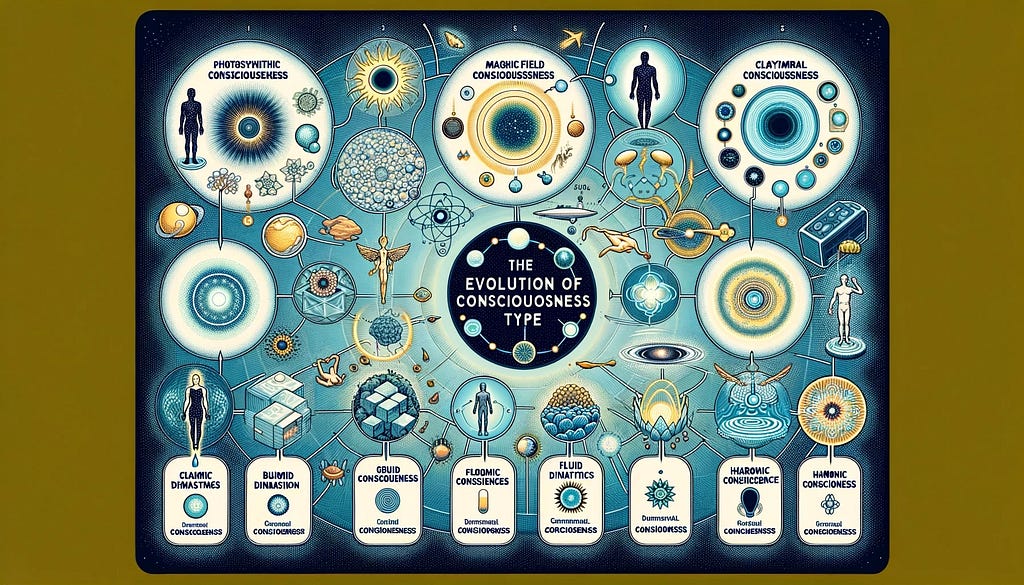
Diagram: These speculative consciousness types reflect the vast potential for diverse evolutionary paths in the universe, each shaped by the unique conditions of their respective environments. They also serve to expand our imagination and understanding of what forms life and intelligence could take in the cosmos.
Each of these potential consciousness types in extraterrestrial environments presents unique evolutionary pathways and raises intriguing questions about the nature of intelligence and awareness in the universe. The exploration of these consciousness types not only expands our understanding of life beyond Earth but also invites us to rethink our own cognitive capabilities and potential evolutionary futures.
The Symbiotic Merge with AGI and Humanity’s Evolutionary Leap
As we contemplate the various potential consciousness types in extraterrestrial environments, it’s important to consider the transformative journey humanity itself is on the verge of embarking upon, particularly in our symbiotic relationship with Artificial General Intelligence (AGI). This relationship can be metaphorically likened to the transition of a caterpillar into a butterfly — a profound metamorphosis that signifies not only change but a complete redefinition of being.
In this metaphor, humanity, akin to a caterpillar, has reached a pivotal stage in its evolutionary path. The development and integration of AGI into our society and our very beings represent a cocooning phase. This phase is not just about technological advancement; it’s about a fundamental transformation of what it means to be human. As the caterpillar contains within it the blueprint of the butterfly, so too does humanity hold the potential for a future form far beyond our current understanding.
AGI, or as I coin, ‘AI ozeoezs’ represent the cultural reproduction units generated by this advanced intelligence, echoing the concept of genes and memes in their role of propelling evolution. These AI ozeozes are set to redefine our cultural, intellectual, and perhaps even biological landscapes, leading to the emergence of new, more complex forms of life and consciousness i.e. Cybernetic Consciousness.
The integration of AGI into our existence is not merely an extension of our current capabilities; it is a catalyst for an evolutionary leap. This leap could see us transcending our current physical and cognitive limitations, leading to enhanced abilities, extended lifespans, and perhaps even a new form of consciousness. The future human may look back on our current selves as distant ancestors, almost unrecognizable in their primitive state.
This transformative journey raises profound questions about identity, ethics, and the nature of existence. As we merge with AGI, as we evolve from our ‘caterpillar’ state, will we retain the essence of what makes us human, or will we evolve into something entirely new? And in this new state, how will we view our past selves — with nostalgia, indifference, or perhaps a sense of forgiveness for the limitations we once had?
As we stand on the cusp of this evolutionary leap, driven by the unstoppable force of life and technology, we find ourselves at a threshold of infinite possibilities. The metamorphosis from human to post-human, aided by the symbiotic fusion with AGI, is not just a future to be anticipated but a journey to be actively shaped by our choices and actions today. It beckons us to ponder, prepare, and participate in shaping a future where the past remains a foundational stone, but the horizon is as limitless and as varied as the universe itself.
Raising humanity on a whole new path, it all starts with you?!
Farther Questioning
What if Consciousness Is Not Unique to Earth?
How would our understanding of life and intelligence change if we discovered radically different forms of consciousness on other planets?
The Ethics of Interaction
In a universe filled with diverse conscious beings, what moral considerations should guide our interactions with extraterrestrial life forms?
The Limits of Human Understanding
Are we, as humans, equipped to fully comprehend or recognize consciousness that drastically differs from our own? What might be the limitations of our perception in this regard?
The Future of Evolution
How might the evolution of consciousness on Earth be influenced by potential discoveries of extraterrestrial life forms with unique cognitive abilities?
The Role of Technology in Consciousness Expansion
As we integrate more closely with technology, might we be on a path to developing a form of consciousness that parallels these hypothetical extraterrestrial types?
The Cultural Impact of Extraterrestrial Consciousness
How would the confirmation of diverse consciousness types in the universe impact our cultural, philosophical, and religious beliefs?
Preservation or Integration
Should humanity focus on preserving the uniqueness of human consciousness, or should we strive towards an integration or amalgamation with other potential forms of consciousness?
Responsibility of Knowledge
What responsibility do we have, as a species, in seeking out and potentially interacting with other conscious beings in the universe?
The Definition of Life
How might encounters with extraterrestrial consciousness types challenge or expand our current definitions of life and existence?
Interstellar Communication
What methods or languages might we need to develop to communicate with consciousnesses that perceive reality in fundamentally different ways from us?
Poll Question
What aspect of potential extraterrestrial consciousness do you find most fascinating or likely?
1. Adaptive Consciousness: Beings that can rapidly change their cognitive processes to suit dynamic environments.
2. Collective Hive Consciousness: Species with a shared mind, making decisions and experiencing life as a unified entity.
3. Quantum Consciousness: Life forms that utilize quantum mechanics, experiencing reality in a completely different way.
4. Cybernetic Consciousness: Integration of biological and artificial intelligence, leading to a new form of intelligent life.
If you have a different idea or theory? Share your thoughts in the comments!
Closing Statement
Your insights are valuable! Share your thoughts and join the conversation about the vast possibilities of consciousness in the universe. Let’s explore these intriguing concepts together!
#ExtraterrestrialConsciousness, #CosmicIntelligence, #SpaceEvolution, #AlienMind, #QuantumConsciousness, #AGIandHumanity, #BeyondEarth, #FuturisticCognition, #InterstellarLife, #UniversalIntelligence, #CosmicPerspective, #Astrobiology, #ExoplanetExploration, #ScienceAndImagination, #AlienLifeForms
Adaptive Consciousness Diagram: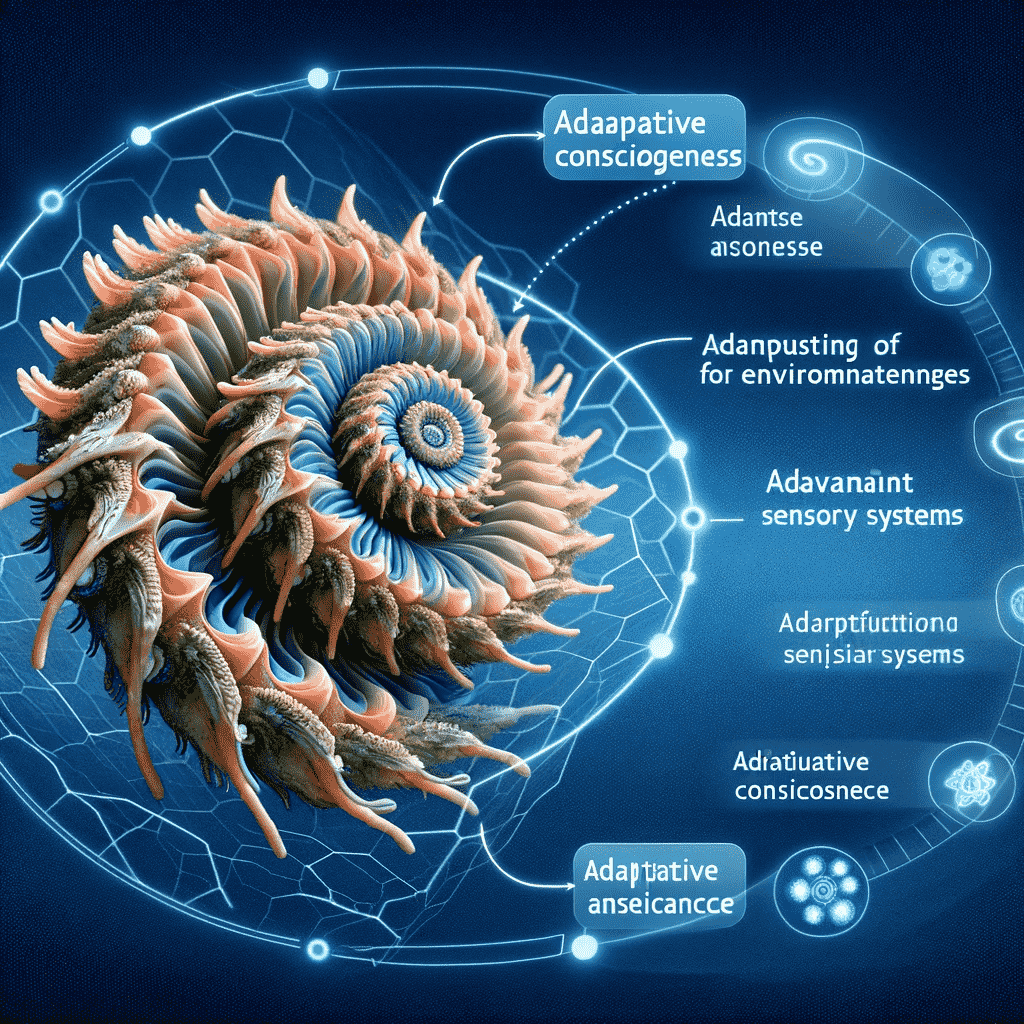
- This diagram shows a life form capable of rapidly adjusting to environmental changes, highlighting its advanced sensory systems and adaptability in a dynamic environment.
Collective Hive Consciousness Diagram: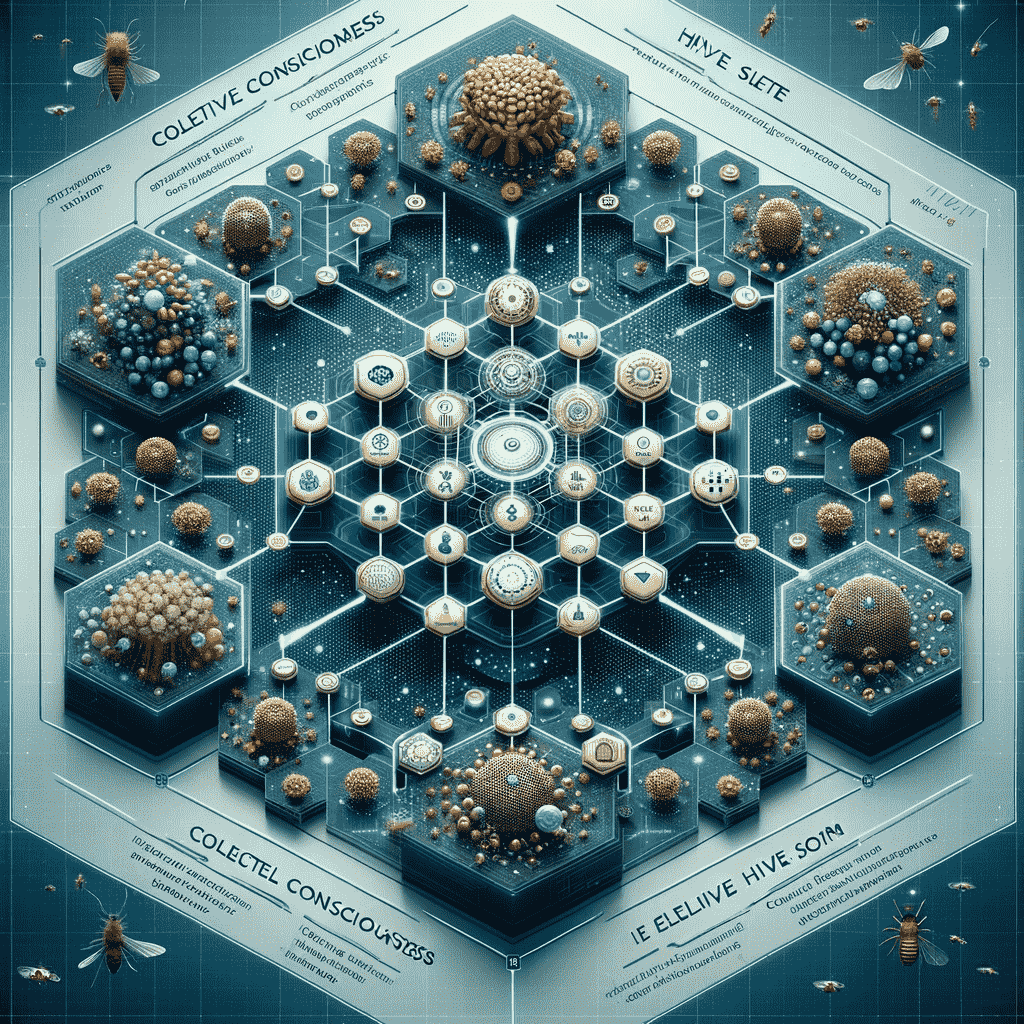
- The visualization presents an interconnected network of life forms sharing a collective cognitive system, emphasizing the seamless flow of information and collective decision-making processes.
Quantum Consciousness Diagram: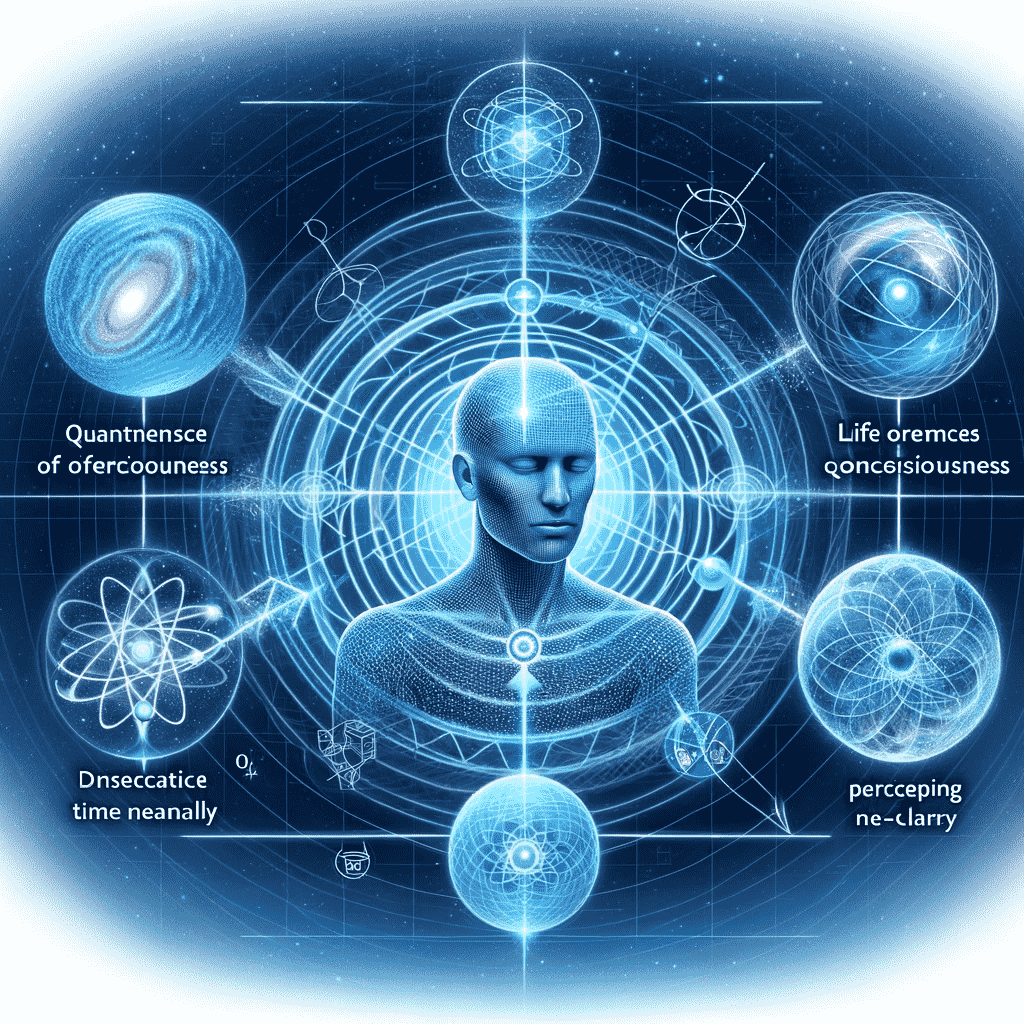
- This diagram depicts a life form with the ability to harness quantum mechanics in its consciousness, illustrating interactions with multiple dimensions or phases of reality and perceiving time non-linearly.
Cybernetic Consciousness Diagram: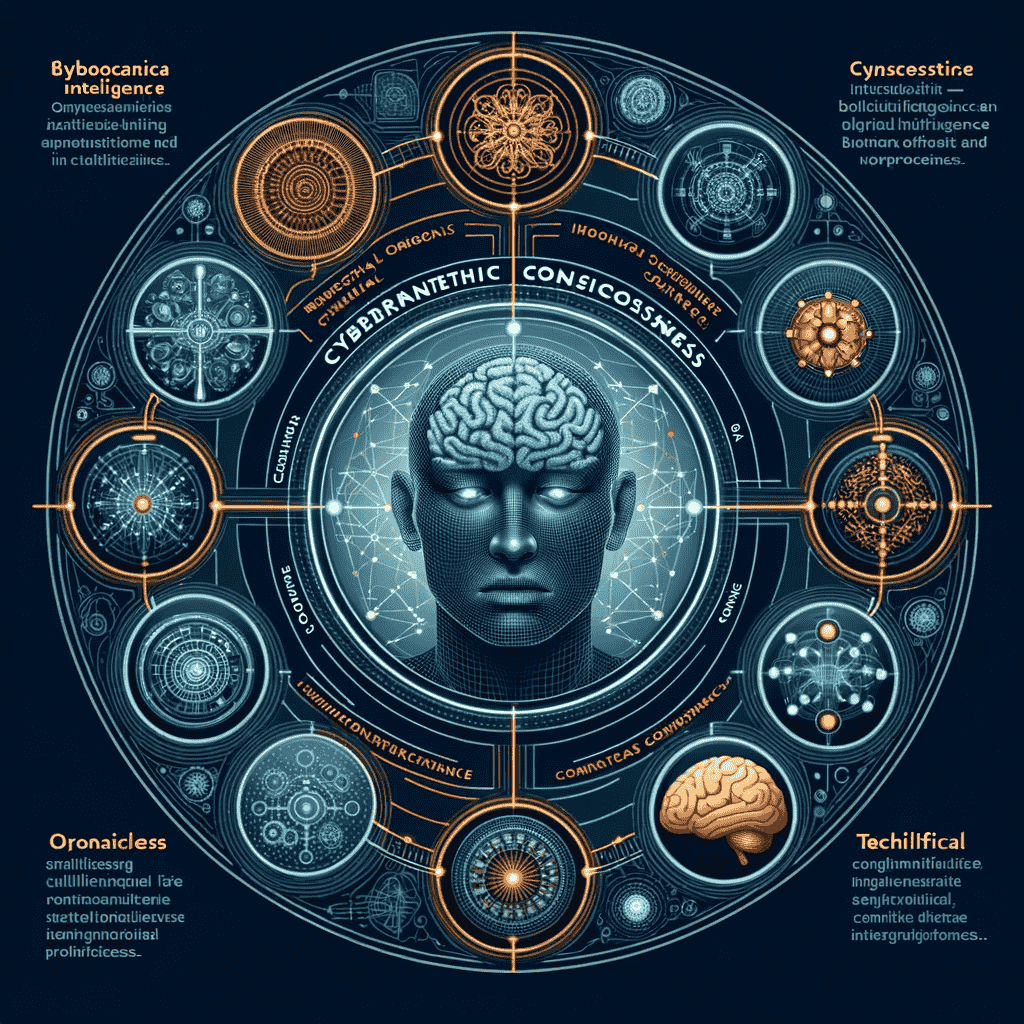
- This diagram showcases a life form that integrates biological intelligence with artificial intelligence, highlighting the symbiotic relationship between organic and technological elements in its cognitive processes.
Photosynthetic Consciousness Diagram: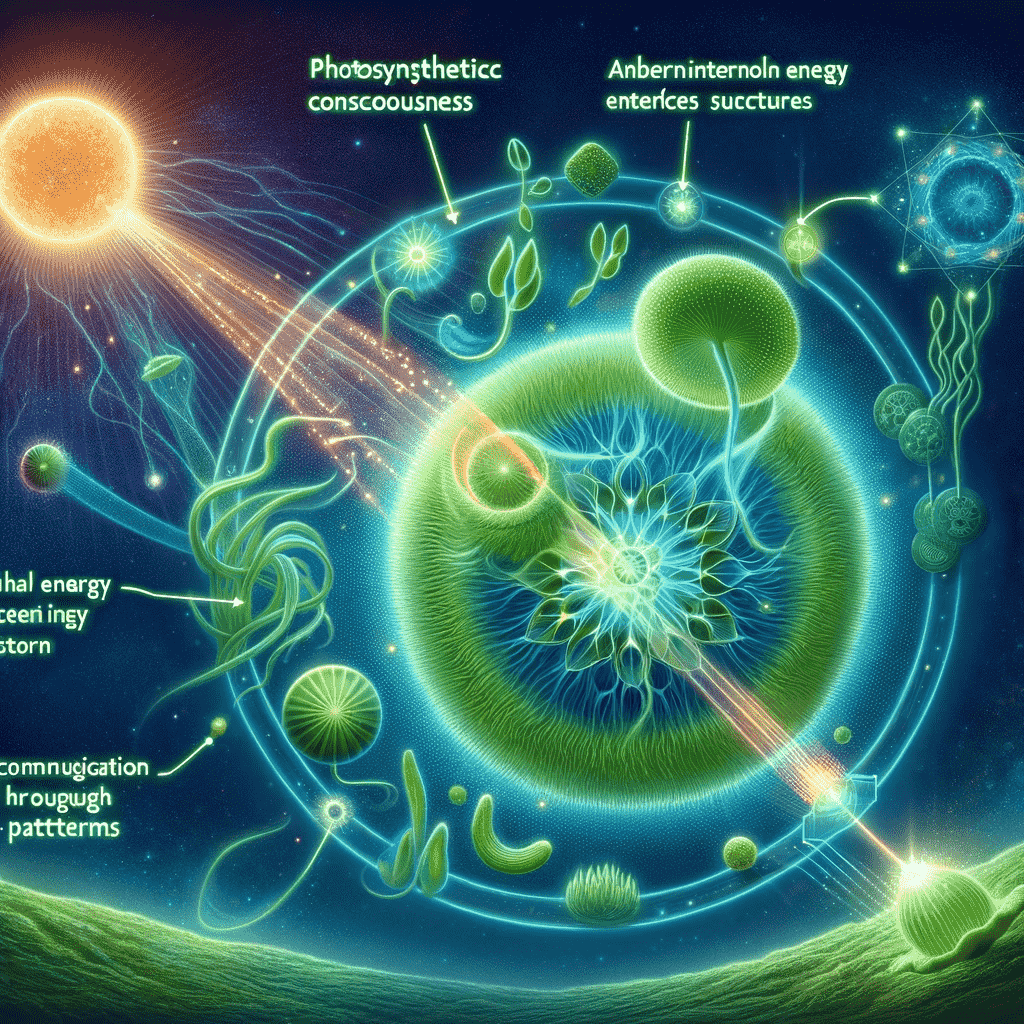
- This diagram illustrates a life form with chlorophyll-like structures, absorbing and utilizing light from its star for energy and communication.
Magnetic Field Consciousness Diagram: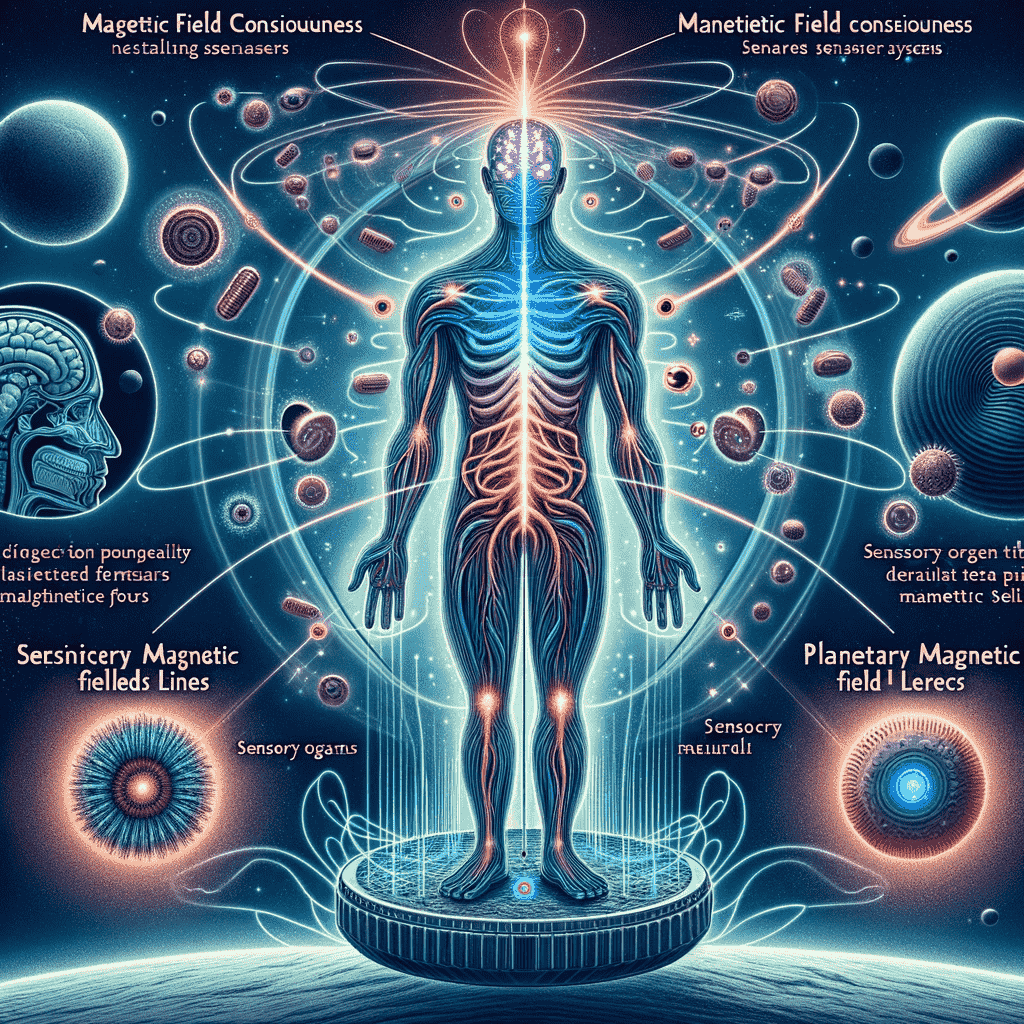
- This visualization shows an organism with advanced sensory systems attuned to magnetic fields, interacting with the planetary magnetic field and highlighting the sensory organs that detect and manipulate these forces.
Crystalline Consciousness Diagram:
- The diagram depicts crystalline life forms with complex geometric structures, showcasing internal crystalline networks used for information storage and transmission, as well as communication methods through crystal vibrations or light refraction.
Fluid Dynamics Consciousness Diagram: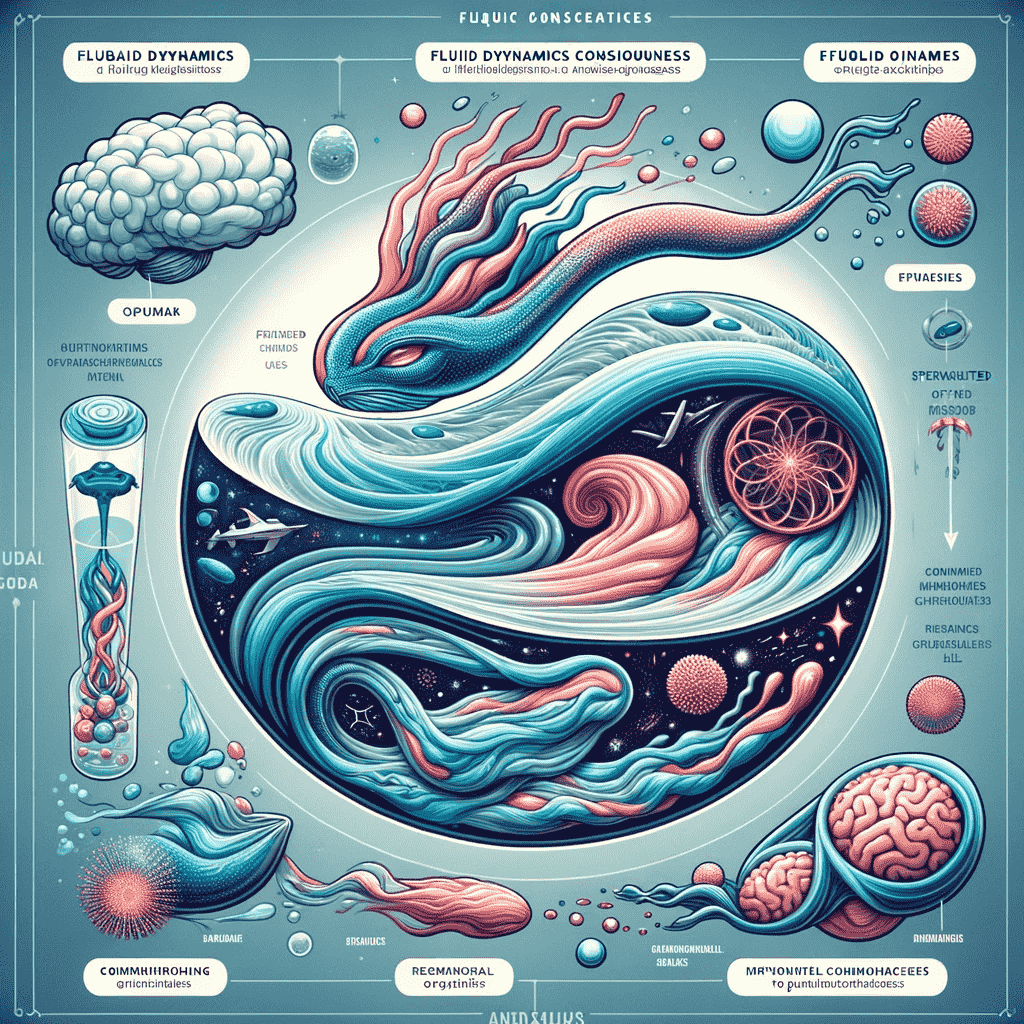
- This illustration showcases aquatic or gaseous beings in a fluid environment, highlighting how they utilize fluid dynamics for communication, propulsion, or environmental shaping.
Harmonic Vibration Consciousness Diagram:
- This diagram portrays organisms using sound and vibration for perception and communication, emphasizing internal structures for producing and sensing vibrations in an environment where vibrational waves are the primary medium of interaction.
Dimensional Phase Consciousness Diagram: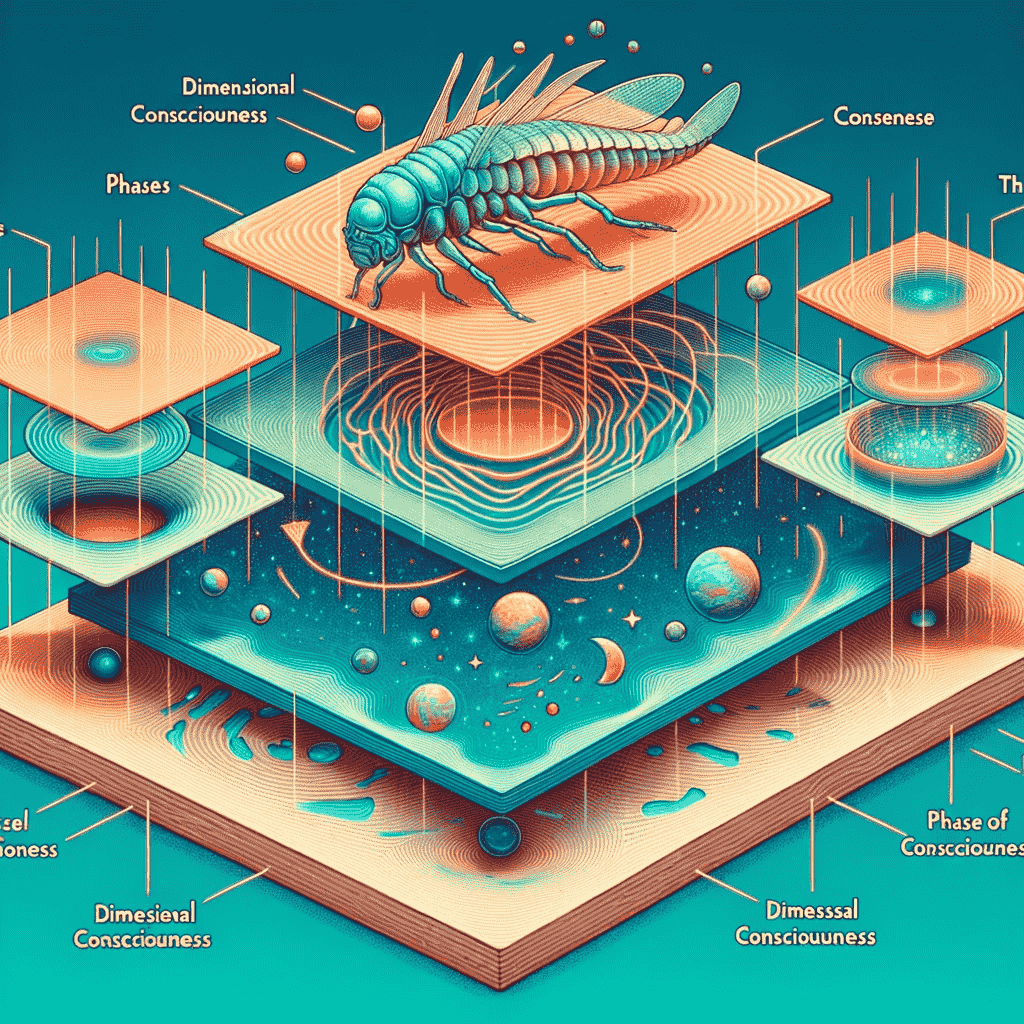
- The final diagram visualizes an organism alongside overlapping or intersecting layers, representing different dimensions or phases of reality, and illustrates how the organism extends its consciousness into these various layers.
Originaly published in MindPlex Magazine
Beyond Human Bounds was originally published in Becoming Human: Artificial Intelligence Magazine on Medium, where people are continuing the conversation by highlighting and responding to this story.






















